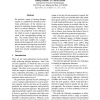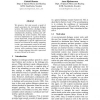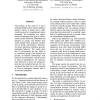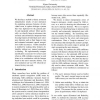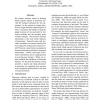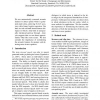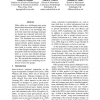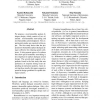104
click to vote
SIGDIAL
2010
14 years 8 months ago
2010
We perform a study of existing dialogue corpora to establish the theoretical maximum performance of the selection approach to simulating human dialogue behavior in unseen dialogue...
131
click to vote
SIGDIAL
2010
14 years 8 months ago
2010
We present a first step towards a model of speech generation for incremental dialogue systems. The model allows a dialogue system to incrementally interpret spoken input, while si...
124
click to vote
SIGDIAL
2010
14 years 12 months ago
2010
The purpose of this study is to get a working definition that matches people's intuitive notion of gossip and is sufficiently precise for computational implementation. We con...
136
click to vote
SIGDIAL
2010
14 years 12 months ago
2010
We develop a method to detect erroneous interpretation results of user utterances by exploiting utterance histories of individual users in spoken dialogue systems that were deploy...
115
click to vote
SIGDIAL
2010
14 years 12 months ago
2010
We present analyses aimed at eliciting which specific aspects of discourse provide the strongest indication for text importance. In the context of content selection for single doc...
115
click to vote
SIGDIAL
2010
14 years 12 months ago
2010
We use automatically extracted acoustic features to detect speech which is generated under stress, achieving 76.24% accuracy with a binary logistic regression. Our data are task-o...
117
click to vote
SIGDIAL
2010
14 years 12 months ago
2010
When dialogue systems, through the use of incremental processing, are not bounded anymore by strict, nonoverlapping turn-taking, a whole range of additional interactional devices ...
148
click to vote
SIGDIAL
2010
14 years 12 months ago
2010
A central problem in Interactive Question Answering (IQA) is how to answer Follow-Up Questions (FU Qs), possibly by taking advantage of information from the dialogue context. We a...
113
click to vote
SIGDIAL
2010
14 years 12 months ago
2010
Older adults are a challenging user group because their behaviour can be highly variable. To the best of our knowledge, this is the first study where dialogue strategies are learn...
SIGDIAL
2010
14 years 12 months ago
2010
We propose a non-humanlike spoken dialogue design, which consists of two elements: non-humanlike turn-taking and non-humanlike acknowledgment. Two experimental studies are reporte...
